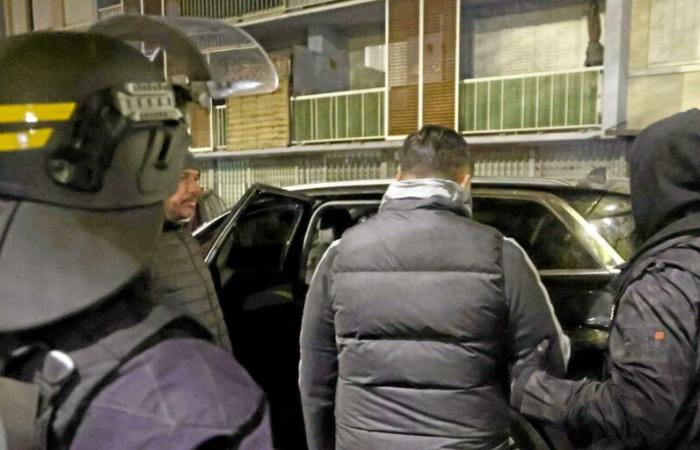
CThis is the little music that has been rising for months. Corruption organized by drug traffickers is gaining ground, at all stages of the circuit which goes from the entry gates of the goods into the territory to prisons, via customs, the police and the justice system.
Every evening from 6 p.m.
Receive the information analyzed and deciphered by the Point editorial staff.
Merci !
Your registration has been taken into account with the email address:
To discover all our other newsletters, go here: MyAccount
By registering, you accept the general conditions of use and our confidentiality policy.
Head of the anti-narcotics office (Ofast), Stéphanie Cherbonnier had informed the Point of his concerns on this subject last summer. “Information that a telephone is tapped, pieces of evidence that go astray… It doesn't take much to compromise months of investigation. »
This week, a report from the Court of Auditors on the fight against drug trafficking raises the subject. “The mass of profits generated by drug trafficking provides resources clearly superior to those of the States” and makes it possible to buy without counting, write the magistrates. They also emphasize that criminal organizations carry out “screening investigations to assess the vulnerability of a person and ensure their assistance”.
Dock workers, customs officers, clerks, police officers…
The report cites dockers and customs agents, law enforcement, magistrates and their auxiliaries, prison staff, but also municipal agents used to store drugs in public buildings.
Business comes one after the other at an accelerating pace. In June 2023, a clerk at the Saint-Nazaire court was arrested. She was transmitting information to a trafficker. In December 2023, two agents from the Meaux-Chauconin penitentiary establishment, including a clerk, were indicted and incarcerated for having facilitated the release of traffickers. In January 2024, nine people, including a border police official at Orly airport, were indicted in a case of trafficking cocaine and cannabis.
In March 2024, six guards from the Réau penitentiary center were indicted for drug trafficking. At least one investigator from the Marseille branch of Ofast is currently the subject of an investigation by the General Inspectorate of the National Police for alleged acts of corruption reported by the hierarchy.
Torpedoed investigation in Rennes
In Rennes, mistrust reigns. In January 2024, says a local source, “an anti-drug operation in the Blosne district was announced to the police at the last moment, because the prosecution and the hierarchy were suspicious of leaks! » They were right. The operation was cut short, someone had warned the traffickers.
“I tell you quite clearly: without corruption, there is no trafficking,” declared Émile Diaz, former member of the French Connection, before the Senate Commission of Inquiry into the impact of drug trafficking in France, which submitted its report in May 2024. Expert opinion.ALSO READ Drug trafficking: why France is not a “narco-state”, but is at a turning point
Despite these warnings, deplores the Court of Auditors, “the announced strengthening of the fight against low and high intensity corruption”, apart from a few one-off initiatives, “has not yet found concrete expression”. Good point for the National Prison Intelligence Service (SNRP), which has implemented “a rigorous training, prevention and sanction policy with regard to its agents likely to be exposed to it”. But elsewhere? “Representatives of the gendarmerie, the national police and customs have undertaken to jointly create an awareness and training module intended for officers,” writes the Court, which calls for accelerating the pace and coordinating efforts. There should be interministerial prevention action and an overall assessment of the risk by the General Inspectorate of Administration.
Sharp increase in judicial investigations for corruption
But does the police-justice channel really want to face reality? Senators Jérôme Durain and Étienne Blanc, president and rapporteur of the Senate Commission of Inquiry, are clearly wondering this. “Very few cases of corruption have been identified, according to the General Directorate of Customs and Indirect Rights,” they write.
The General Inspectorate of the National Police, for its part, confirms a sharp increase in judicial investigations initiated into counts of passive corruption, increasing from 14 in 2020 to 29 in 2022, but “without isolating the facts likely to be linked to trafficking of narcotics”. “It is clear that the number of corruption cases handled by specialized interregional courts is low, while criminal organizations often benefit from information enabling them to thwart investigations,” wrote – already in 2019 – François Molins, then attorney general at the Court of Cassation…
Pragmatic measures
To Discover
Kangaroo of the day
Answer
Underlining the urgency, the senators propose pragmatic and rapid measures to be implemented. “Make corruption of public officials materially impossible” by reviewing the organization of work, with more pairs and turnover. In unison with the Court of Auditors, they suggest “better detection of abnormal uses of police files”.
This is one of the lessons of recent cases: corrupters often pay very dearly for seemingly innocuous services. “At the port of Le Havre, a secretary received 10,000 euros for inserting a USB key into her computer, which led to hacking into a computer system and allowed the criminals to control the arrival of containers,” the senator told the senators. economist Clotilde Champeyrache. A docker can earn 60,000 euros simply by “losing” his badge. A poisoned gift, which will however link him to delinquents who will stop at nothing.





